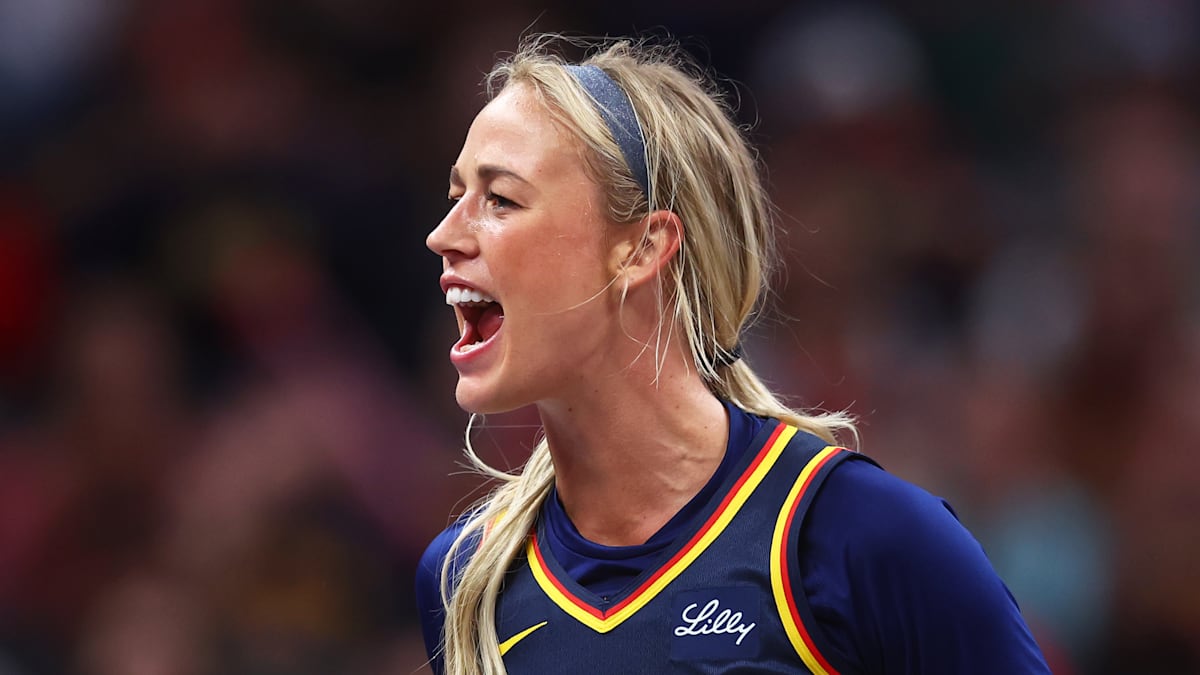In the world of professional sports, departures are a fact of life. Players are traded, contracts end, and careers conclude. But it’s the nature of the exit that often defines its legacy. A quiet, unceremonious departure can sometimes create more noise than the most public of trades, sparking questions of loyalty, professionalism, and the unwritten rules that govern a locker room.
This was precisely the case when WNBA veteran DeWanna Bonner abruptly left the Indiana Fever, setting off a chain reaction of events that involved a podcast, a former teammate, and a 35-point game that served as a brutal exclamation point.
The saga began with confusion. When DeWanna Bonner suddenly disappeared from the Indiana Fever’s lineup, the fanbase and even her teammates were left in the dark. In the absence of information, speculation ran wild. Was it a family emergency? A private health matter? Fans who had passionately supported her were concerned, assuming the best and hoping for her well-being.
The truth, when it surfaced, was far more complicated and grounded in professional and personal choices. Bonner wanted out, reportedly to join her partner, Alyssa Thomas, on the Connecticut Sun. While players seeking new opportunities is standard, leaving a team mid-stride without a word of explanation to the organization or its supporters is not.

The silence was deafening, leaving a void that was soon filled by the voice of Sophie Cunningham. A former teammate of Bonner’s at both the Phoenix Mercury and the Indiana Fever, Cunningham took to her podcast, “The Show Me Something Podcast,” to address the situation. Her take wasn’t a scathing attack but a nuanced critique rooted in professional courtesy. “I like DB,” she clarified, acknowledging Bonner’s Hall of Fame-caliber talent. “But I also think that if you’re going to leave… it’s okay to be professional about it.”
Cunningham’s point was simple: a text message would have sufficed. A brief note to teammates saying, “Hey, sorry this didn’t work out. Good luck,” could have smoothed over the abruptness of the departure. She argued that while Bonner had the right to pursue her own happiness, especially towards the end of her career, the way she handled it left her teammates and the fans who had supported her feeling blindsided and disrespected. It was a sentiment that resonated with many who felt the move lacked class. As Cunningham noted, people make choices that are better for them but inconvenience others, but the key is communication. Bonner’s ghosting of an entire franchise felt like a breach of that fundamental professional respect.

In the hyper-connected world of sports, these comments were never going to stay confined to a podcast audience. They became bulletin-board material. As fate would have it, Cunningham’s current team, the Phoenix Mercury, was scheduled to play the Indiana Fever. The narrative was set: Cunningham had called out her former teammate, and now the two sides were set to clash on the court. While some might have expected the Indiana Fever to play with a chip on their shoulder, it was the Mercury who weaponized the drama.
According to Cunningham’s later statements, her own team wasn’t thrilled with her comments but decided to use them as fuel. The result was an absolute demolition. The Phoenix Mercury didn’t just beat the Indiana Fever; they dismantled them in a 35-point blowout. It was a stunning margin of victory that went beyond a simple on-court mismatch. It was a statement. The Mercury played with a ferocity and focus that suggested they were fighting for more than just a win; they were responding to the off-court chatter with on-court dominance.
For the Fever, the loss was a humiliating indictment. The question quickly turned to their own coaching staff and leadership. Why hadn’t they used the situation—Bonner’s departure and Cunningham’s homecoming—as their own motivation? Why did they appear so flat and unprepared for the emotional intensity of the game? Critics pointed fingers at Fever coach Stephanie White, whose close friendship with Bonner and Thomas was seen as a potential conflict of interest that may have neutered the team’s ability to rally against their former player. The lopsided loss suggested a team adrift, unable to channel the surrounding drama into a competitive fire.
The fallout didn’t end with the final buzzer. The story took another turn when Cunningham revealed more on her podcast. She described the Mercury as a team that was “just drama,” suggesting that the internal dynamics were far from perfect, even in victory. She also mentioned that other players around the league had reached out to her, privately agreeing with her assessment of how Bonner’s exit was handled. This shed light on a broader sentiment among players: professionalism matters, and peer accountability is real, even if it happens behind closed doors or on podcasts.
Meanwhile, the fanbases became embroiled in a war of words online. Supporters of DeWanna Bonner launched aggressive attacks against Cunningham, flooding her social media with vitriolic messages. They saw her comments as a betrayal, while Cunningham’s defenders saw her as speaking a necessary truth about professional etiquette. The incident exposed the deep, often toxic, tribalism of modern sports fandom, where nuance is lost and athletes are reduced to heroes and villains.
This entire episode serves as a fascinating case study in the modern athlete’s world. It highlights the power of new media platforms, where players like Cunningham can control their own narratives and speak directly to the public without the filter of traditional sports journalism. It also underscores how personal relationships and off-court dynamics can have a profound and measurable impact on team performance. In a league as tight-knit as the WNBA, where everyone knows everyone, the lines between personal and professional are easily blurred.
Ultimately, the story of DeWanna Bonner’s exit and Sophie Cunningham’s commentary is about more than just a single game. It’s about the unspoken contract between a player, their teammates, and the fans who invest their time and emotion into supporting them. It’s a reminder that in sports, how you leave can be just as important as how you played. A quiet exit can create the loudest drama, and a few honest words on a podcast can ignite a fire that burns brightest under the stadium lights.





